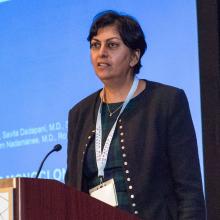LA JOLLA, CALIF. – Combining a radio-labeled, anti-CD25, monoclonal antibody with BEAM chemotherapy appears to be an effective and safe conditioning regimen prior to autologous stem cell transplant in patients with peripheral T-cell lymphoma (PTCL), investigators report.
In a phase 1 trial, median progression-free survival (PFS) was 10.6 months for patients treated with the yttrium-90–labeled, chimeric, anti-CD25 antibody basiliximab (Simulect) at one of three dose levels plus standard dose BEAM (carmustine, etoposide, cytarabine, and melphalan), said Jasmine Zain, MD, of the City of Hope Medical Center in Duarte, Calif.
There have been no significant cases of delayed transplant engraftment or unexpected increases in either mucositis or infectious complications, she said at the annual T-cell Lymphoma Forum.
Although it’s still too early to know whether adding the beta-emitting antibody basiliximab to BEAM will improve outcomes, the investigators are encouraged by the early results and are expanding the trial to include more patients, Dr. Zain said in an interview.“With standard conditioning, I think the best outcome we have seen is that at 5 years we have about 45% to 50% event-free survival, depending on the histology,” she said. “So we’re hoping we will surpass that.”
The first patient to receive a transplant in the study was treated in July 2015, and since most relapses in this patient population tend to occur within 2 years of transplant, the investigators expect that they will get a better idea of the results in the near future, Dr. Zain said.
PTCL generally has a poor prognosis, and many centers have turned to high-dose therapy followed by autologous stem cell transplant as a consolidation strategy for patients who are in their first or subsequent complete remissions, as well as for patients with relapsed or refractory disease.
“We in this field consider autologous stem cell transplant to be not curative for PTCL. It is true that some patients will achieve long-term remission and even long-term survival,” she said. ”But overall, even with long-term data, it seems like most patients will eventually relapse.”
The goal of the ongoing study is to determine whether adding basiliximab to BEAM could improve outcomes in the long run.
Unlike ibritumomab tiuxetan (Zevalin) – an yttrium-90–labeled antibody that’s been combined with rituximab to target CD20 in relapsed or refractory low-grade follicular B-cell non-Hodgkin lymphoma – basiliximab is targeted to CD25, which is preferentially expressed on T cells.
Basiliximab has been shown to inhibit growth of human anaplastic large cell lymphoma (ALCL) tumors and improve survival in mice bearing human tumor xenografts.
Because the beta particles that basiliximab emits cannot be detected on conventional scans, the antibody is also labeled with an indium-111 radiotracer for purposes of tracking.
At the time of Dr. Zain’s presentation, 13 patients ranging from 19 to 77 years of age were enrolled in the phase 1 trial. The patients were assigned to receive basiliximab at a dose of either 0.4, 0.5, or 0.6 mCi/kg in combination with standard dose BEAM.
The first patient treated had delayed engraftment of platelets; all subsequent patients had engraftment as expected.
There were no grade 3 or 4 toxicities at any dose level and no treatment-related mortality. The most frequent toxicity was grade 2 stomatitis, which occurred in three patients each in the 0.4 and 0.6 miC/kg levels and in four patients at the 0.5 miC/kg level of basiliximab. There were no dose-limiting toxicities.
As of the data cutoff, three patients have experienced relapses, and two of those patients died from disease progression. The times from transplant to relapse were 301 days and 218 days in the two patients who died, and it was 108 days in the third patient.
Dose expansion is continuing in the study, with an additional seven patients scheduled for treatment at the 0.6 miC/kg dose, Dr. Zain said.
Dr. Zain did not report information on conflicts of interest. The study is supported by City of Hope Medical Center and the National Cancer Institute. The T-cell Lymphoma Forum is held by Jonathan Wood & Associates, which is owned by the same company as this news organization.
hematologynews@frontlinemedcom.com
SOURCE: Zain J et al. TCLF 2018.


